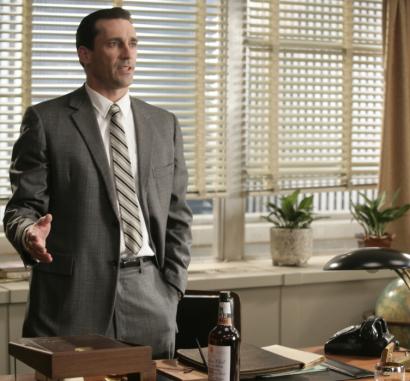As TV spots lose effectiveness, Tim Spengler's Initiative USA helps clients find new ways to market their products.
Tim Spengler's first act after being named president of the media-buying firm Initiative USA was to draft a small team of what he calls amphibians.He wanted to make a splash. He also recognized that advertising executives would need webfeet to navigate, even survive, in the intensely competitive and rapidly changing ad industry. Like creatures that can live on land or in the water, media planners must master two dramatically different environments: old and new media.
"The world is becoming so much more complex," said Spengler, 43, who this year took charge of Initiative USA, which helps plan advertising campaigns for such companies as Bayer, Coors, AOL, Home Depot, Hyundai and Kia. "We have to understand and prepare for the changes."
Shifting media consumption patterns have stirred angst on Madison Avenue. Advertisers' tool of choice for the last half-century -- the 30-second television spot -- is becoming less effective. More people are using digital video recorders to zip through commercials. Fewer people are watching broadcast networks, and young consumers are just as likely to find entertainment on the Internet as on TV.
Chief marketing officers at major companies have long faced pressure to perform, but it has become more intense. These marketing chiefs, in their jobs for less than two years on average, frequently fire their media firm to jump to a new one, adding more stress for executives such as Spengler.
"It used to be all about 'How many ratings points are we buying?' and 'What's our awareness level?' " Spengler said during a recent visit to Southern California to tour New York-based Initiative's offices in Los Angeles and San Diego.
Now, instead of simply coordinating clients' TV advertising plans and then negotiating their time buys on ABC, CBS or CNN, which was largely Spengler's job a few years ago, there's a sea of digital media for advertisers to swim in.
This year Spengler's challenge is complicated by fears of a recession, which could prompt companies to tighten ad spending, and the recently concluded Hollywood writers strike. The networks got a late start this year on their TV pilots and few are finished. That means when the advertising sales season kicks off next week in New York, advertisers will be asked to put big money down on network schedules that are still in flux.
In a blow two weeks ago, Spengler's top lieutenant, Alan Cohen, defected to become chief executive of OMD USA, another prominent ad firm. Cohen, who was the head of Initiative's Hollywood business, is now one of Spengler's chief competitors. Spengler called Cohen's departure "a huge loss, but we will continue to make great hires."
Spengler was probably destined to run an ad agency. When he was a boy growing up in Connecticut, he would spend hours studying the merchandise in the fat Montgomery Ward and Sears, Roebuck catalogs.
"I was always interested in brands. I thought they were cool and exciting," Spengler said in a staccato-burst style of speaking. He would cut out pictures of logos, the CBS eye and the NBC peacock, to hang on his bedroom wall. He wrote to Adidas and Puma to ask for their decals.
"If there had been a Web back then, I never would have gone out," he said.
When Spengler was in college, where he was a championship tennis player, he couldn't decide on a profession. In his senior year his father, head of marketing for Bristol-Myers, sent Spengler's fraternity a subscription to the trade publication Advertising Age. That did the trick.
Spengler worked for two ad firms in New York. In 1993 he flew to Los Angeles for a Saturday morning interview with the head of Western International Media, a now-defunct company that helped pioneer the specialty of ad buying. In most agencies, buyers were "fourth-class citizens," Spengler said, several rungs below the creative directors who design the ads.
Western was different. The boss told him, "The stars of our company are the buyers."
"That was all I needed to hear," Spengler recalled.
Within two years, ad giant Interpublic Group bought Western and eventually merged it with Initiative. Spengler continued to climb the ranks and in 2002 he "begrudgingly left L.A.," he said, for a bigger job in New York as Initiative's chief negotiator. In 2006 he became chief activation officer, coordinating Initiative's buying units.
During the last year Initiative has expanded, adding such major clients as Hyundai, Cadbury Schweppes, CBS Corp. and Showtime. Instead of hiring Initiative to simply negotiate ad buys, more companies are looking for expertise in selecting what forms of media to buy.
It used to be that the most powerful element of an advertisement was its message. But now for advertisers, Spengler said, "where you are says a lot about who you are."
In the coming years the conversion to digital media will intensify. Next year television stations are expected to convert to digital from analog signals, which should trigger a tidal wave of information about consumers' media habits.
"We have to figure out how consumers are using all forms of media," Spengler said. "It's a challenging time. We are all trying to figure it out, but no one has the answer."

